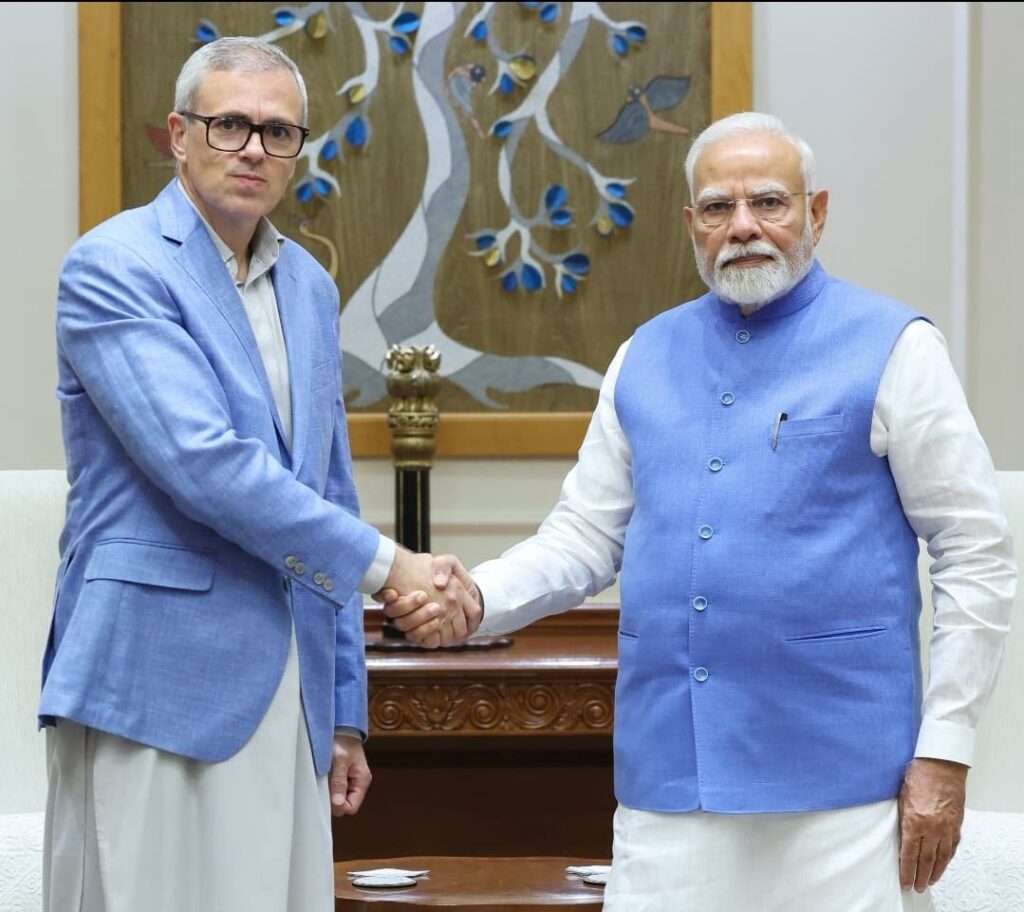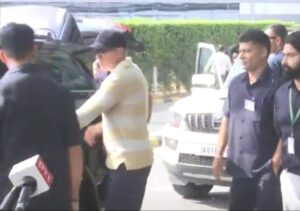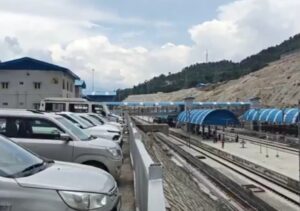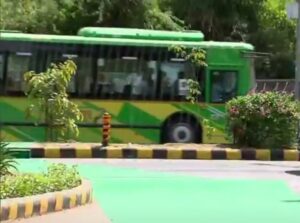Omar Abdullah Meets PM Modi Amid Tensions Post-Pahalgam Attack: A Focus on Unity and Strategy
Samba Times Special

New Delhi, May 4, 2025 – In a significant development amid escalating tensions between India and Pakistan following the devastating Pahalgam terror attack on April 22, 2025, Jammu and Kashmir Chief Minister Omar Abdullah met with Prime Minister Narendra Modi on Saturday, May 3, in the national capital. This marked their first meeting since the attack, which claimed 26 lives, mostly tourists, in the picturesque Baisaran Valley of Pahalgam, and has pushed the region to the brink of a potential military conflict. The 30-minute high-level discussion, held at the Prime Minister’s official residence, centered on the security situation, the economic fallout of the attack, and the need for a unified national response to counter terrorism.
The Pahalgam attack, attributed to the Pakistan-based terror group Lashkar-e-Taiba and its proxy, The Resistance Front, has reignited long-standing tensions between the two nuclear-armed neighbors. The brutal massacre of civilians, including 25 Indians and one Nepali citizen, has drawn widespread international condemnation, with over 60 nations expressing solidarity with India. In response, India has adopted a hardline stance, suspending the Indus Water Treaty, closing its airspace to Pakistani flights until May 23, and granting the Indian Armed Forces “complete operational freedom” to determine the mode, targets, and timing of a response. Prime Minister Modi has repeatedly vowed a “harshest response” to the perpetrators and their backers, signaling the possibility of military action similar to India’s responses to the 2016 Uri and 2019 Pulwama attacks.
Against this backdrop, Chief Minister Abdullah’s meeting with PM Modi was a critical moment to align regional and national strategies. Sources indicate that Abdullah briefed the Prime Minister on the ground situation in Jammu and Kashmir, emphasizing the public’s resolve to combat terrorism.
“I have never seen people come out to protest against an attack like this… people said not in my name,”
Abdullah had earlier stated, highlighting the unprecedented public outrage in the region. The discussions reportedly covered measures to strengthen security, particularly in light of the upcoming Amarnath Yatra, a major pilgrimage set to commence on July 3 along the Pahalgam route. The attack’s potential to disrupt tourism, a lifeline for the local economy, was another key concern raised by Abdullah.
The meeting also focused on a rare display of political unity.
The Jammu and Kashmir Legislative Assembly passed a unanimous resolution on April 28 condemning the attack, and opposition leaders, including Congress’s Rahul Gandhi and National Conference president Farooq Abdullah, have voiced strong support for decisive action.
Farooq Abdullah, a vocal advocate for dialogue with Pakistan in the past, has now endorsed a “befitting reply,” reflecting the gravity of the situation. Omar Abdullah, while cautious about the narrative of local involvement in the attack, reaffirmed his government’s commitment to dismantling the terror ecosystem, with 175 suspects detained and 10 houses of suspected terrorists demolished since the attack.
The specter of war loomed large over the discussions, with Pakistan’s defense minister warning of rising conflict risks and its military reaffirming its “unflinching resolve” to counter any aggression.
India’s recent military posturing, including a large-scale naval firing exercise off the Gujarat coast and intensified ceasefire violations along the Line of Control, has further heightened tensions.
Pakistan’s offer for a neutral probe into the attack was met with skepticism by Abdullah, who questioned its legitimacy given Islamabad’s initial denials of involvement.
Prime Minister Modi reiterated India’s unwavering resolve to deliver justice, emphasizing that the armed forces have his full confidence to act decisively. The meeting also touched on diplomatic efforts, with External Affairs Minister S. Jaishankar engaging global counterparts to maintain international support. The United States, under President Donald Trump, has expressed firm backing for India’s fight against terrorism, while other world leaders, including those from France, Israel, and Italy, have condemned the attack.
Analysts view the Abdullah-Modi meeting as a strategic alignment to project national unity and prepare for potential escalation. “This is not just about security but also about ensuring that the narrative of peace and progress in Kashmir isn’t derailed,” said Praveen Donthi, a senior analyst at the International Crisis Group. However, the attack has exposed vulnerabilities in the normalcy in Kashmir, with critics like Abdullah having previously warned against equating tourism with stability.
As India weighs its options—ranging from targeted military strikes to sustained diplomatic pressure—the Omar Abdullah-PM Modi meeting signals a concerted effort to balance immediate security imperatives with long-term stability in Jammu and Kashmir. With the nation on edge and the international community urging restraint, the coming weeks will be pivotal in determining whether the Pahalgam attack leads to a broader conflict or a resolute, yet measured, response.
Adv Sukhdev Singh Sambyal ✍️
Editor in Chief
Samba Times
उमर अब्दुल्ला की पीएम मोदी से मुलाकात: पहलगाम हमले के बाद युद्ध के खतरे के बीच एकजुटता और रणनीति पर चर्चा
नई दिल्ली, 4 मई 2025 – पहलगाम में 22 अप्रैल 2025 को हुए भीषण आतंकी हमले के बाद भारत और पाकिस्तान के बीच बढ़ते तनाव के बीच, जम्मू-कश्मीर के मुख्यमंत्री उमर अब्दुल्ला ने शनिवार, 3 मई को राष्ट्रीय राजधानी में प्रधानमंत्री नरेंद्र मोदी से मुलाकात की। यह हमले के बाद उनकी पहली मुलाकात थी, जिसमें पहलगाम के बाईसरण घाटी में 26 लोगों, ज्यादातर पर्यटकों की जान गई थी, और क्षेत्र एक संभावित सैन्य संघर्ष की ओर बढ़ रहा है।
प्रधानमंत्री के आधिकारिक निवास पर हुई 30 मिनट की उच्च-स्तरीय चर्चा में सुरक्षा स्थिति, हमले के आर्थिक प्रभाव और आतंकवाद का मुकाबला करने के लिए एकजुट राष्ट्रीय प्रतिक्रिया की आवश्यकता पर ध्यान केंद्रित किया गया।पहलगाम हमला, जिसे पाकिस्तान स्थित आतंकी समूह लश्कर-ए-तैयबा और इसके प्रॉक्सी, द रेजिस्टेंस फ्रंट से जोड़ा गया है, ने दोनों परमाणु-सशस्त्र पड़ोसियों के बीच लंबे समय से चले आ रहे तनाव को फिर से भड़का दिया है। 25 भारतीयों और एक नेपाली नागरिक सहित नागरिकों की नृशंस हत्या ने व्यापक अंतरराष्ट्रीय निंदा को आकर्षित किया है, जिसमें 60 से अधिक देशों ने भारत के साथ एकजुटता व्यक्त की है। जवाब में, भारत ने कड़ा रुख अपनाया है, जिसमें सिंधु जल संधि को निलंबित करना, 23 मई तक पाकिस्तानी उड़ानों के लिए अपने हवाई क्षेत्र को बंद करना, और भारतीय सशस्त्र बलों को प्रतिक्रिया के तरीके, लक्ष्य और समय निर्धारित करने के लिए “पूर्ण परिचालन स्वतंत्रता” देना शामिल है। प्रधानमंत्री मोदी ने बार-बार अपराधियों और उनके समर्थकों को “कठोरतम जवाब” देने की कसम खाई है, जो 2016 के उडी और 2019 के पुलवामा हमलों के जवाब में भारत की कार्रवाइयों के समान सैन्य कार्रवाई की संभावना को दर्शाता है।
इस पृष्ठभूमि में, मुख्यमंत्री अब्दुल्ला की पीएम मोदी के साथ मुलाकात क्षेत्रीय और राष्ट्रीय रणनीतियों को समन्वयित करने का एक महत्वपूर्ण क्षण था। सूत्रों के अनुसार, अब्दुल्ला ने प्रधानमंत्री को जम्मू-कश्मीर की जमीनी स्थिति के बारे में जानकारी दी, जिसमें आतंकवाद से लड़ने के लिए जनता के संकल्प पर जोर दिया गया।
“मैंने पहले कभी लोगों को इस तरह हमले के खिलाफ विरोध करते नहीं देखा… लोगों ने कहा कि मेरे नाम पर नहीं,”
अब्दुल्ला ने पहले कहा था, जो क्षेत्र में अभूतपूर्व जनाक्रोश को उजागर करता है। चर्चा में सुरक्षा को मजबूत करने के उपायों पर विचार किया गया, विशेष रूप से 3 जुलाई से शुरू होने वाली अमरनाथ यात्रा को ध्यान में रखते हुए, जो पहलगाम मार्ग से होकर गुजरती है। हमले से पर्यटन पर पड़ने वाला संभावित प्रभाव, जो स्थानीय अर्थव्यवस्था के लिए जीवनरेखा है, अब्दुल्ला द्वारा उठाया गया एक और प्रमुख मुद्दा था।
इस मुलाकात ने राजनीतिक एकता का एक दुर्लभ प्रदर्शन भी किया। जम्मू-कश्मीर विधानसभा ने 28 अप्रैल को हमले की निंदा करने वाला एक सर्वसम्मत प्रस्ताव पारित किया, और विपक्षी नेता, जिनमें कांग्रेस के राहुल गांधी और नेशनल कॉन्फ्रेंस के अध्यक्ष फारूक अब्दुल्ला शामिल हैं, ने निर्णायक कार्रवाई के लिए मजबूत समर्थन व्यक्त किया है। फारूक अब्दुल्ला, जो पहले पाकिस्तान के साथ संवाद के पक्षधर रहे हैं, ने अब “उचित जवाब” का समर्थन किया है, जो स्थिति की गंभीरता को दर्शाता है। उमर अब्दुल्ला ने, हमले में स्थानीय भागीदारी की कहानी के प्रति सतर्कता बरतते हुए, आतंकवादी पारिस्थितिकी तंत्र को ध्वस्त करने के लिए अपनी सरकार की प्रतिबद्धता दोहराई, जिसमें हमले के बाद से 175 संदिग्धों को हिरासत में लिया गया और 10 संदिग्ध आतंकवादियों के घरों को ध्वस्त किया गया।
युद्ध की आशंका चर्चाओं पर छाई रही, जिसमें पाकिस्तान के रक्षा मंत्री ने बढ़ते संघर्ष के जोखिम की चेतावनी दी और उसकी सेना ने किसी भी आक्रामकता का जवाब देने के लिए अपने “अटल संकल्प” को दोहराया। भारत की हालिया सैन्य गतिविधियां, जिसमें गुजरात तट पर बड़े पैमाने पर नौसैनिक गोलीबारी अभ्यास और नियंत्रण रेखा पर बढ़ती युद्धविराम उल्लंघन शामिल हैं, ने तनाव को और बढ़ा दिया है। पाकिस्तान की हमले की तटस्थ जांच की पेशकश को अब्दुल्ला ने संदेह के साथ देखा, जिन्होंने इस्लामाबाद के शुरुआती इनकार को देखते हुए इसकी वैधता पर सवाल उठाए।
प्रधानमंत्री मोदी ने न्याय दिलाने के लिए भारत के अटल संकल्प को दोहराया, यह जोर देकर कहा कि सशस्त्र बलों को निर्णायक कार्रवाई के लिए उनका पूर्ण विश्वास है। बैठक में राजनयिक प्रयासों पर भी चर्चा हुई, जिसमें विदेश मंत्री एस. जयशंकर ने वैश्विक समकक्षों के साथ बातचीत कर अंतरराष्ट्रीय समर्थन बनाए रखने की कोशिश की। संयुक्त राज्य अमेरिका, राष्ट्रपति डोनाल्ड ट्रम्प के नेतृत्व में, ने आतंकवाद के खिलाफ भारत की लड़ाई के लिए दृढ़ समर्थन व्यक्त किया है, जबकि फ्रांस, इजरायल और इटली सहित अन्य विश्व नेताओं ने हमले की निंदा की है।
विश्लेषकों का मानना है कि अब्दुल्ला-मोदी मुलाकात राष्ट्रीय एकता को प्रदर्शित करने और संभावित वृद्धि के लिए तैयारी करने का एक रणनीतिक समन्वय है। “यह केवल सुरक्षा के बारे में नहीं है, बल्कि यह सुनिश्चित करने के बारे में भी है कि कश्मीर में शांति और प्रगति की कहानी पटरी से न उतरे,” इंटरनेशनल क्राइसिस ग्रुप के वरिष्ठ विश्लेषक प्रवीण डोंथी ने कहा। हालांकि, हमले ने कश्मीर में सामान्य स्थिति के मोदी सरकार के दावों की कमजोरियों को उजागर किया है, जिसमें अब्दुल्ला जैसे आलोचकों ने पहले पर्यटन को स्थिरता के समान मानने के खिलाफ चेतावनी दी थी।
जबकि भारत अपने विकल्पों पर विचार कर रहा है—लक्षित सैन्य हमलों से लेकर निरंतर राजनयिक दबाव तक—उमर अब्दुल्ला-पीएम मोदी की मुलाकात तत्काल सुरक्षा जरूरतों को जम्मू-कश्मीर में दीर्घकालिक स्थिरता के साथ संतुलित करने के एक ठोस प्रयास का संकेत देती है। राष्ट्र तनाव में है और अंतरराष्ट्रीय समुदाय संयम की अपील कर रहा है, ऐसे में आने वाले सप्ताह यह निर्धारित करने में महत्वपूर्ण होंगे कि क्या पहलगाम हमला एक व्यापक संघर्ष की ओर ले जाएगा या एक दृढ़, फिर भी संतुलित, जवाब की ओर।*अस्वीकरण: प्रस्तुत जानकारी उपलब्ध रिपोर्टों और एक्स पर पोस्ट पर आधारित है, जिसमें असत्यापित दावे शामिल हो सकते हैं। स्थिति बदलती रहती है, और पाठकों को अपडेट के लिए विश्वसनीय समाचार स्रोतों का अनुसरण करने के लिए प्रोत्साहित किया जाता है।





